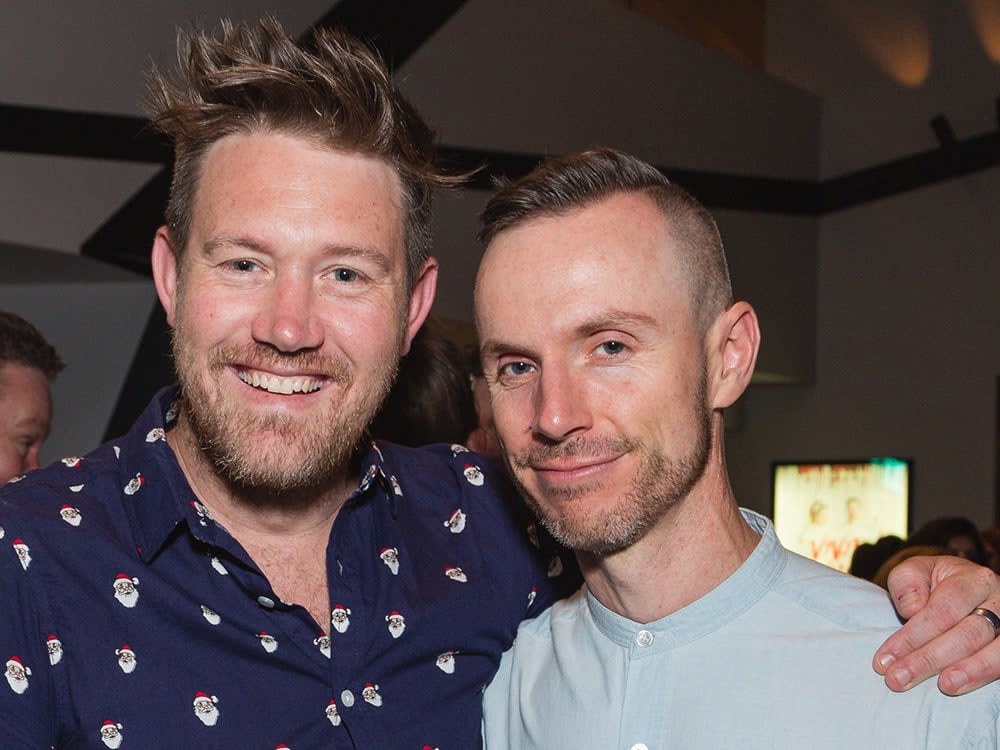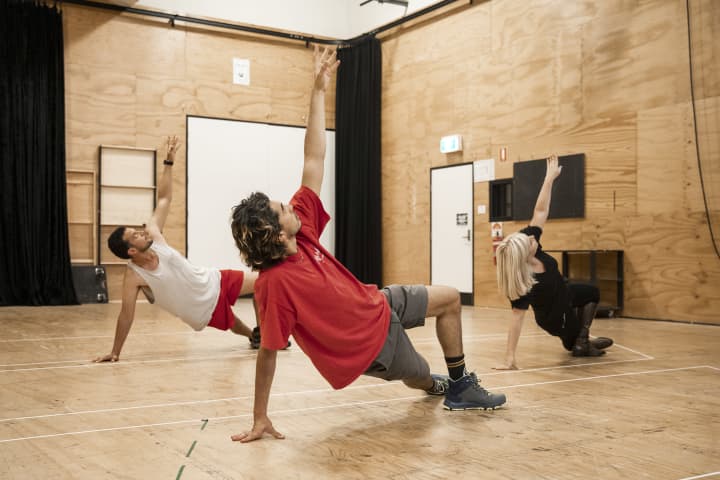In an unexpected way, former MTC Associate Director Dean Bryant found that he strangely enjoyed the slower pace of 2020. He knows just how lucky he is to be able to say that, but admits that if it weren’t for Melbourne’s lockdowns, he never would have taken time off to reflect.
Had the pandemic not happened, Dean Bryant’s 2020 would have been full throttle. He spent the first weeks and months of the year directing Torch the Place, which was three quarters of the way through a sold-out season at Arts Centre Melbourne when the first wave of COVID restrictions slammed the brakes on our lives. He was to have followed that show with Merrily We Roll Along for Hayes Theatre, and then the blockbuster musical Fun Home for both Melbourne and Sydney Theatre Companies. Instead, like so many in the industry, he found himself professionally adrift.
‘Because I had no work, the year forced me to slow down,’ he says. ‘It took a lot of stomach-dropping anxiety to get to that point. But once I let go and accepted that all my jobs were gone for now, that I couldn’t plan future work and had to accept that I would just be in my apartment and going for walks for the foreseeable future, I could just appreciate the city in a new way.’ Ultimately, Bryant notes that without being forced into theatrical hibernation he simply wouldn’t have taken a break. ‘You can’t, in the gig economy,’ he adds wryly.
From the universal to the unique
There was the universal experience of 2020 – the initial shock and horror; the ongoing tedium and horror; the weird things that time did – and then are all the billions of individual, personal experiences. Given the opportunity and space to reflect on the year in a performance for MTC, Bryant wanted to shine a light on some of these personal-yet-universal stories. So he sat down with five friends and shaped their words into the two-night-only verbatim theatre piece Well, That Happened, in which those same five actors will perform their own stories.
‘These are five people I’ve worked with a lot; they are all long-time theatre professionals, all currently at their creative peaks. And they’re all charming as well,’ he says of his collaborators Esther Hannaford, Bert LaBonté, Zahra Newman, Christina O’Neill and Eddie Perfect. ‘But I chose the performers because each of them had had significant life challenges at the height of the pandemic. So they’d had not only the universal experiences we all had, but also quite specific ones.’
Plenty of pandemic stories
Bryant shares a couple of examples of the stories that will be explored in the show. Christina O’Neill, for instance, gave birth to her first child during the pandemic. ‘She was seven months along when the first lockdown started, and I knew just from talking to her on a regular basis that it was uniquely stressful,’ he says. On top of the same questions we were all asking ourselves, O’Neill had others, such as ‘will my husband be allowed in the room with me during the birth?’
Eddie Perfect, meanwhile, had been in New York for his Broadway musical adaptation of Beetlejuice ‘and suddenly he’s bringing his whole family back home and grappling with what it means to be back in Australia again after being in America for a couple of years. What has changed, what hasn’t, what do you notice about the two cultures that’s different, especially as you’re suddenly rushing home as Coronavirus is taking out Broadway.’

Eddie Perfect and Dean Bryant at the opening of Vivid White in 2017. Photo: Heath Warwick
And of course, he notes, ‘all five of the performers talk about what it was like to be in lockdown; what it was like to be an artist who really didn’t get a lot of governmental attention for a long time; what it felt like to have political movements going on during this period and either be affected by it or observing it or trying to interact with it – the same things that we all shared.’
Working artists
Bert LaBonté’s piece, in particular, focuses on the experience of being an arts worker at a time when the arts seemed to matter more than anything to some and not at all to others. ‘The arts are so fundamental to every single human person’s life that they don’t realise the arts are important at all,’ muses Bryant. ‘I think art is like air and if someone suddenly said we should support air, we need air, people would go “but it’s just there so why should we support it?” For me, the arts are the same because we literally never spend a moment of our life not being ensconced in the arts. It’s something that we do in every single culture since time immemorial, and we just naturally take it for granted. And because we take it for granted and we simultaneously think it’s the most special thing and rewarded thing ever, there is still a lack of knowledge that most artists in a capitalist society can’t actually survive off the thing they do.’
Bryant says that LaBonté emphasises the importance of the phrase ‘arts worker’ as opposed to artist in his piece, which reflects on the diligent, patient, slow task of ‘not only doing the work but also politicking for the arts: we need to politic as a body for people to understand our worth, as well as making the work, which is the thing we actually care about. It’s almost like you’ve got to commit 20% of your art-work practice to fighting on behalf of the practice.’
‘Until you can actually threaten to and do take something away from people, it’s very hard to get them to value it, even though they inherently value it by their choices.’
Part of the difficulty, he explains, is that the nature of being an artist requires resilience, and a ‘can do’ attitude. ‘Artists will always find a way and therefore there’s no fear that they will ever just stop. So it’s really hard to make the argument that we need support because people somehow know that we’ll just make it through no matter what; we’ll just make it work. Until you can actually threaten to and do take something away from people, it’s very hard to get them to value it, even though they inherently value it by their choices. And if that didn’t change this year, when it was obvious how much we relied on art, then I don’t know what's going to change that. Very little, would be my guess.’
While Bryant ultimately made peace with his forced hiatus, he is looking forward to theatre’s return, and ‘doing all the little stuff that makes up the job of being a director’ such as setting artistic goals, working with a designer and talking to the actors. But mostly, he’s looking forward to ‘connecting with an audience. I’ll know I’ve done my job again when I get a group of humans to talk about what it is to be a human, and other humans shared it and responded to it – and that’s pretty exciting.’
Well, That Happened was originally part of MTC’s Summer Series but was cancelled due to the snap lockdown in February. Fortunately, we’ve been able to reschedule this funny and unique reflection on 2020 for two special performances on Saturday 10 April, 2021.
Published on 8 February 2021





